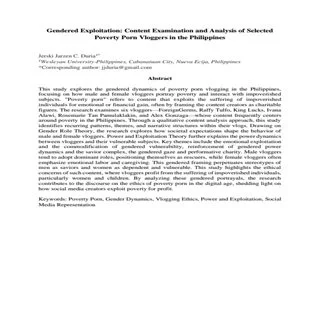This study explores the gendered dynamics of poverty porn vlogging in the Philippines, focusing on how male and female vloggers portray poverty and interact with impoverished subjects. "Poverty porn" refers to content that exploits the suffering of impoverished individuals for emotional or financial gain, often by framing the content creators as charitable figures. The research examines six vloggers-ForeignGerms, Raffy Tulfo, King Lucks, Ivana Alawi, Rosemarie Tan Pamulaklakin, and Alex Gonzaga-whose content frequently centers around poverty in the Philippines. Through a qualitative content analysis approach, this study identifies recurring patterns, themes, and narrative structures within their vlogs. Drawing on Gender Role Theory, the research explores how societal expectations shape the behavior of male and female vloggers. Power and Exploitation Theory further explains the power dynamics between vloggers and their vulnerable subjects. Key themes include the emotional exploitation and the commodification of gendered vulnerability, reinforcement of gendered power dynamics and the savior complex, the gendered gaze and performative charity. Male vloggers tend to adopt dominant roles, positioning themselves as rescuers, while female vloggers often emphasize emotional labor and caregiving. This gendered framing perpetuates stereotypes of men as saviors and women as dependent and vulnerable. This study highlights the ethical concerns of such content, where vloggers profit from the suffering of impoverished individuals, particularly women and children. By analyzing these gendered portrayals, the research contributes to the discourse on the ethics of poverty porn in the digital age, shedding light on how social media creators exploit poverty for profit.
Unpublished paper, 2024.



